|
|
|
Sort Order |
|
|
|
Items / Page
|
|
|
|
|
|
|
| Srl | Item |
| 1 |
ID:
167644
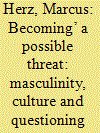

|
|
|
|
|
| Summary/Abstract |
A debate on masculinity and immigration rose across Europe in 2015 after an incident with sexual harassments taking place in Cologne, Germany. The incident refuelled a debate positioning unaccompanied young men as a possible threat. This article is based on a research project where we during this time ethnographically followed 20 young men, having arrived in Sweden as ‘unaccompanied’ minors. The aim is to examine how the young men themselves talk about, reflect on and negotiate masculinity and gender during this period. The article concludes that masculinity cannot be approached as something stable easily being inherited or transferred from one’s origins. One difference for ‘unaccompanied’ young men is how conflicts or tensions emerging in relation to issues of gender and masculinity tend to be interpreted differently, and publicly, putting the young men in a ‘gendered situation of questioning’.
|
|
|
|
|
|
|
|
|
|
|
|
|
|
|
|
| 2 |
ID:
142220


|
|
|
|
|
| Summary/Abstract |
The future of foreign policy think tanks should involve acting as a training ground for the next generation of international affairs professionals. Internships are widely recognized as a way of improving young people’s skills and employment prospects. A case study of the Australian Institute of International Affairs’ (AIIA’s) internship program shows how foreign policy institutes can form a bridge between the academic grounding that universities provide and the rigours and requirements of a career in international affairs. Survey results from more than 100 interns showed an overwhelmingly positive reaction to their internship experience, with over 98 percent recommending the program. A range of learning outcomes and career benefits were reported. Foreign policy institutes wishing to contribute to career development should consider introducing internship programs that include goal setting, high-quality supervision, expert training, and career advice. They can help build the future of the field one internship at a time.
|
|
|
|
|
|
|
|
|
|
|
|
|
|
|
|
| 3 |
ID:
188946
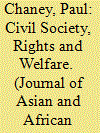

|
|
|
|
|
| Summary/Abstract |
This study examines Cambodia’s implementation of the United Nations Convention on the Rights of the Child (CRC). Corpus analysis of civil society organisations’ submissions to the United Nations Universal Periodic Review reveals a raft of CRC violations, including sexual abuse, trafficking and child labour. This is due to political and bureaucratic failings. The wider significance of this lies in underlining how the disjuncture between state and civil society underpins ongoing violations. Future progress depends on strengthened mobilisation yet increasing repression of civil society makes this unlikely. Accordingly, the prospects are bleak with children in Cambodia continuing to suffer widespread rights violations.
|
|
|
|
|
|
|
|
|
|
|
|
|
|
|
|
| 4 |
ID:
147661
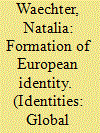

|
|
|
|
|
| Summary/Abstract |
Research into European identity has mostly focused on majority populations in Western European countries, neglecting new member states in Central and Eastern Europe (CEE) as well as ethnic minority groups. This paper contributes to filling this gap by exploring and investigating processes of European identity formation of five ethnic minority groups in four CEE countries. A generational perspective was applied by conducting qualitative in-depth interviews with three generations of ethnic minority group members. The results support the instrumental approach of identity construction. In all minority groups researched, the young generation, due to more positive personal experiences and perceived benefits from the European Union, have developed more positive images and perceptions of Europe and a greater sense of European identity than older generations. Furthermore, ethnic group-specific processes of identity formation were found.
|
|
|
|
|
|
|
|
|
|
|
|
|
|
|
|
| 5 |
ID:
140429


|
|
|
|
|
| Summary/Abstract |
Although survey data identify no significant predictor of intolerance among the Russian population, young people are considered to display heightened levels of ethnic intolerance and radical variants of xenophobia. Drawing on survey and semi-structured interview data from a study of patriotism among young people in two cities in the North-West region of Russia, this article explores the strength of ethnic self-identification and ethnically exclusive notions of Russianness and compares levels and forms of ethnic intolerance. Identifying that routine expression of xenophobic sentiments coexists alongside a commitment to principles of ethnic equality, the article considers what the ambiguities and contradictions in the articulation of intolerance tell us about how young people negotiate complex contemporary multicultural societies.
|
|
|
|
|
|
|
|
|
|
|
|
|
|
|
|
| 6 |
ID:
128177
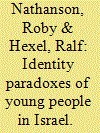

|
|
|
|
|
| Publication |
2012.
|
| Summary/Abstract |
Today's youth accept the ambiguity of the status quo and reject the dichotomous world outlook on political, economic, and social issues, creating instead a a unified picture composed of the fragments.
|
|
|
|
|
|
|
|
|
|
|
|
|
|
|
|
| 7 |
ID:
134399
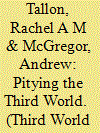

|
|
|
|
|
| Summary/Abstract |
The development sector appeals to emotions in its marketing and education material to raise awareness and funds for its work. Much of this material is now directed at schools, where young people form long-lasting opinions about development and the developing world. This paper draws upon research with 118 students in five New Zealand/Aotearoa secondary schools to show that young people are not passive receptors of development marketing and education. Instead, they question the activities of international ngos involved in aid work and how they are meant to feel or act in response. We examine these emotional responses of young people and the demoralising feelings of guilt, sadness and scepticism that arise, often alongside an innocent paternalism and a desire to help. We outline possibilities for more socially progressive forms of development education, based on the recognition that young people are questioning old ways of doing aid work and looking for something new. We challenge ngos to be part of new forms of global connectedness that disrupt old ‘us and them’ binaries based on difference, and instead to pursue new linkages based on shared feelings of empathy, friendship and social justice.
|
|
|
|
|
|
|
|
|
|
|
|
|
|
|
|
| 8 |
ID:
174852
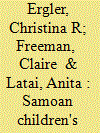

|
|
|
|
|
| Summary/Abstract |
Pacific Island communities are experiencing significant societal changes as a result of rural urban, inter‐island migration and migration to New Zealand. These relocations have significant implications for children's relationship to place. However, virtually nothing is known about children's sense of place in Samoa or places and activities that are important to them. This exploratory study worked with eight children aged 5–12 years growing up in an urban village in Samoa drawing on ‘Talanoa’ as research methodology and method by employing photo‐elicitation. The study provides a first snapshot of Samoan children's sense of place growing up in an urban village.
|
|
|
|
|
|
|
|
|
|
|
|
|
|
|
|
| 9 |
ID:
148401
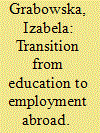

|
|
|
|
|
| Summary/Abstract |
This article examines the subject of the transition from education to the labour market among young people moving directly from education in Poland to first jobs abroad. With free labour mobility in the European Union (EU), there are now more options for transitions into adulthood, including working abroad. This study uses mainly qualitative empirical material with some contextual quantitative data to examine the characteristics of young people who opted for a first job abroad, how they made their transitions from education to the foreign labour market, and the impact of their first jobs abroad on their subsequent occupational paths after returning home.
|
|
|
|
|
|
|
|
|
|
|
|
|
|
|
|
| 10 |
ID:
089238
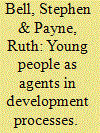

|
|
|
|
|
| Publication |
2009.
|
| Summary/Abstract |
This paper explores the role of young people in development processes. This is achieved through an examination of the latest developments in literature concerning young people's identity, agency and experiences of power relations and by reflecting on our own empirical research with young people in Zambia (child-headed households) and Uganda (empowerment and sexual health). In particular, we discuss the opportunities and challenges faced by young people in terms of taking greater control over their own lives and contributing to the development of their communities. In doing so we further understanding of how young people (inter)act to improve their own lives and negotiate the challenging-and changing-realities and relationships they experience.
|
|
|
|
|
|
|
|
|
|
|
|
|
|
|
|
| 11 |
ID:
119919
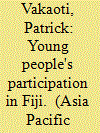

|
|
|
|
|
| Publication |
2013.
|
| Summary/Abstract |
Young people's participation is central to the attainment of meaningful governance systems. In Fiji, this is a challenge as the traditional view of young people's participation is restricted to that of 'service' and the precarious political environment restricting free expression. Despite these concerns, young people's participation and expression appear to be thriving in hybridised forms. This paper draws from conversations with a group of 'active' young people and discusses the merits and challenges of their participation in Fiji. As a nation, Fiji is at the threshold of a new socio-political era, where young people are expected to play a significant role. This discussion offers an understanding of young people's participation in Fiji and draws attention to how they can be meaningfully supported as active citizens in the process of national development.
|
|
|
|
|
|
|
|
|
|
|
|
|
|
|
|
|
|
|
|
|